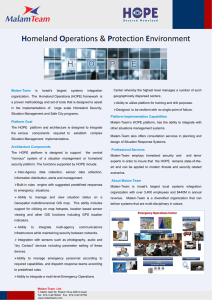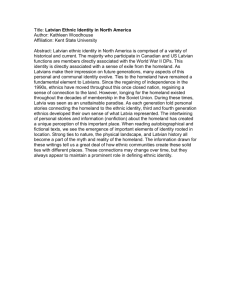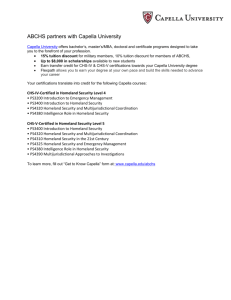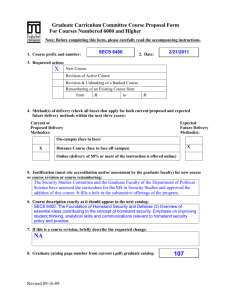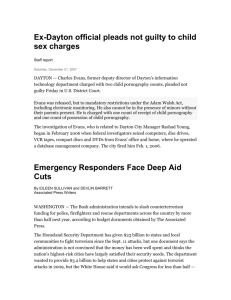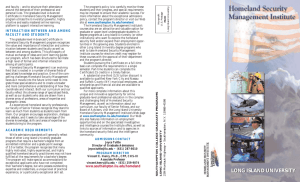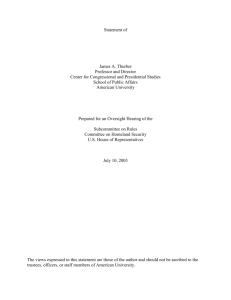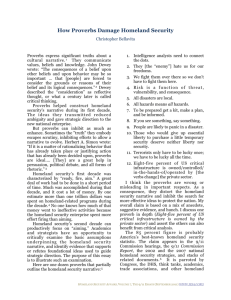Constitutional Issues and Homeland Security - Fdu
advertisement
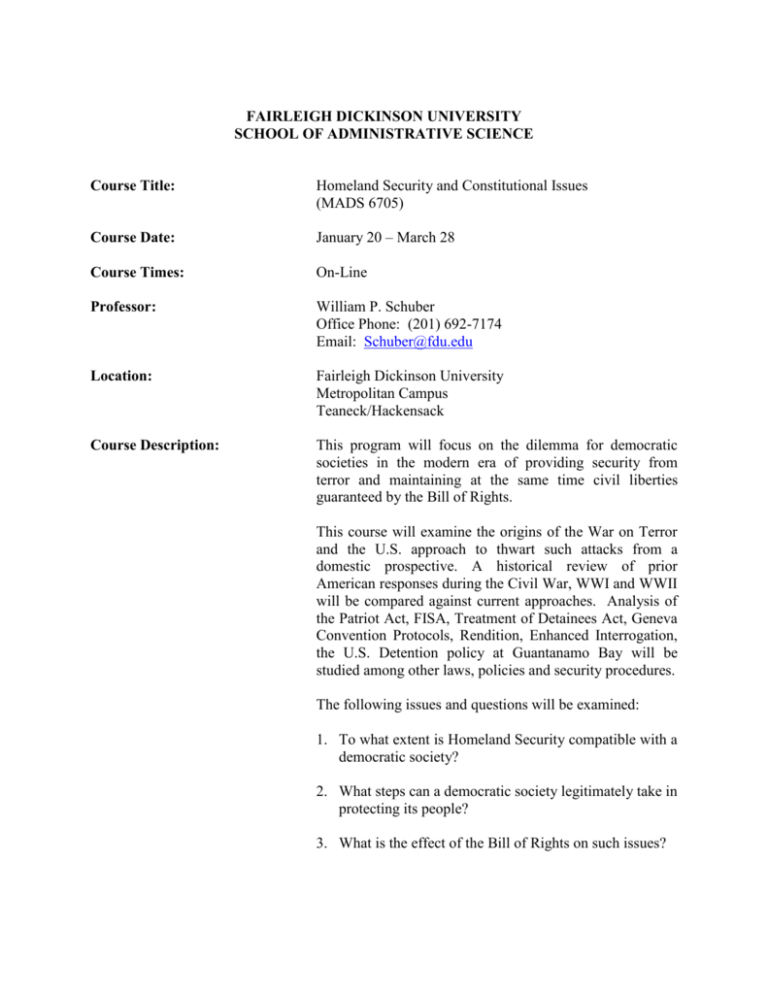
FAIRLEIGH DICKINSON UNIVERSITY SCHOOL OF ADMINISTRATIVE SCIENCE Course Title: Homeland Security and Constitutional Issues (MADS 6705) Course Date: January 20 – March 28 Course Times: On-Line Professor: William P. Schuber Office Phone: (201) 692-7174 Email: Schuber@fdu.edu Location: Fairleigh Dickinson University Metropolitan Campus Teaneck/Hackensack Course Description: This program will focus on the dilemma for democratic societies in the modern era of providing security from terror and maintaining at the same time civil liberties guaranteed by the Bill of Rights. This course will examine the origins of the War on Terror and the U.S. approach to thwart such attacks from a domestic prospective. A historical review of prior American responses during the Civil War, WWI and WWII will be compared against current approaches. Analysis of the Patriot Act, FISA, Treatment of Detainees Act, Geneva Convention Protocols, Rendition, Enhanced Interrogation, the U.S. Detention policy at Guantanamo Bay will be studied among other laws, policies and security procedures. The following issues and questions will be examined: 1. To what extent is Homeland Security compatible with a democratic society? 2. What steps can a democratic society legitimately take in protecting its people? 3. What is the effect of the Bill of Rights on such issues? 4. What is the effect on civil liberties of current homeland security issues? 5. Can the Government simultaneously provide proactive homeland security and protect civil liberties? Course Objectives: 1. To provide master level studies for the non-traditional student involved in Homeland Security. 2. To contribute to the preparation of students who will formulate and execute Domestic Security programs. 3. Encourage the development of thoughtful, high quality Homeland Security strategy and tactics that are products of thorough analysis and research with due sensitivity to the requirements of the Bill of Rights and protection of civil liberties. Course Text: Homeland Security and Constitutional Issues McGraw-Hill – Primis On-Line Nineteen Eighty Four, A Novel George Orwell, 1949 U.S. Constitution 9/11 Commission Report, Authorized Edition Supplemental Reading: The Constitution in Exile, by Judge Andrew Napolitano Thomas Negron Publishing, 2006, ISBN: 1-59555-070-4 (trade paper) On the Hunt, by Colonel David Hunt Crown Forum, 2007, ISBN: 978-0-307-34759-6 The One Percent Doctrine, by Ron Suskind Simon & Schuster, 2006, ISBN-13: 978-0-7432-7109-7 The Idea That is America, by Anne Marie Slaughter Basic Books, 2007, ISBN-10:465-07808-7 2 Ghost War, by Steve Coll Penguin Books, 2004, ISBN: 0-14-30.3466 9 Nemesis, by Chalmers Johnson Henry Holt & Co., 2006, ISBN-13: 978-0-8050-7911-1 Entrance Competencies: It is expected that students will be familiar with basic structure and provisions of the U.S. Constitution, the bill of Rights, and the Separation of Powers between the Executive, Legislative and Judicial Branches. Students are also expected to have a working knowledge of basic Homeland Security programs and requirements. Exit Competencies: By completion of the class, students will be able to: 1. Understand the dynamics and tension between strict domestic security programs and Constitutional Liberties. 2. Understand the ethical and legal issues involved in Homeland Security. 3. Understand the current judicial decisions involving issues of Homeland Security, War on Terror, detention and wiretapping. 4. Understand the Constitutional questions raised about various domestic security policies and their impact on civil liberties, particularly detention, rendition and wiretapping. 5. Understand the legal and security concerns raised by certain Homeland Security policies, particularly enhanced interrogation techniques, national security letters. 6. Understand and articulate Homeland Security policies that are strategic, thoughtful and compatible with guarantees of the Bill of Rights and civil liberties. 7. Understand various approaches employed by countries of the European community to Acts of Terrorism. 3 Expectations: Class Participation: Class participation will be based on the quality of your class contribution and your regular attendance. In order to integrate the course concepts, it is important that you be prepared to discuss the assigned material and related issues when you come to class. You will be responsible to demonstrate your application of course content to your workplace or the system you choose to study. Attendance: All students will attend each class. There are no make ups. Two absences will result in a lower grade. More than two absences will result in a grade of F. Academic Integrity: FDU’s Public Administration Institute and its faculty do not condone academic dishonesty in any form. The obligations and responsibilities for this course are governed by the Academic Integrity Policy presented in the Graduate Studies Bulletin. It is your responsibility to familiarize yourself with this policy. Grading: Mid-Term, Topic assigned by Professor – 30% Final Paper – Topic to be assigned by Professor – 50% Class Participation – 20% 4 CLASS SCHEDULE WEEK 1 Self-Introductions and Class Requirement WEEK 2 Introduction to Homeland Security and the Bill of Rights Novel 1984 – pgs. 1-60 WEEK 3 9/11 and the U.S. Domestic Response Creation of Department of Homeland Security 9/11 Commission Report – Chapters 12 and 13; Novel 1984 – pgs. 60-90 WEEK 4 Homeland Security, an Historical Perspective Novel 1984 – pgs. 90-150 WEEK 5 Mid-Term Research Papers due WEEK 6 The Patriot Act; Right to Privacy Novel 1984 – pgs. 150-200 WEEK 7 Foreign Intelligence Surveillance Act (FISA) and Domestic Surveillance; Novel 1984 – pgs. 200-240 WEEK 8 Enemy Combatants, Torture and Jose Padilla Novel 1984 – 240-275 WEEK 9 European Response to Terrorism; Future of Homeland Security and Potential Effect on Citizens and Civil Liberties Novel 1984 – pgs. 275-300 WEEK 10 Final Research Papers 5 6

